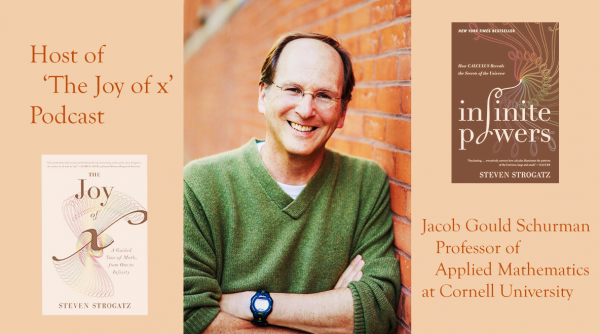Complex Systems Seminar Special Event | Searching for the densest network that does not always synchronize
Steven Strogatz, Applied Mathematics, Cornell University

Tuesday, November 17, 2020
2:30-4:00 PM
Virtual
PLEASE NOTE THE START TIME OF 2:30 PM!
ALSO NOTE, THIS SEMINAR WILL BE RECORDED.
SEMINAR LINK: myumi.ch/v2ZYv
Abstract: Consider a network of identical phase oscillators with sinusoidal coupling. How likely are the oscillators to globally synchronize, starting from random initial phases? One expects dense networks to have a strong tendency to synchronize and the basin of attraction for the synchronous state to be the whole phase space (except for a set of measure zero). But, how dense is dense enough? In this (hopefully) entertaining Zoom talk, we use techniques from nonlinear dynamics, numerical linear algebra, and computational algebraic geometry to derive the densest known networks that do not synchronize and the sparsest networks that do. This is joint work with Alex Townsend and Mike Stillman.
___
Dr. Strogatz - Jacob Gould Schurman Professor of Applied Mathematics at Cornell University - is the author of several international bestsellers about math, including "Infinite Powers" and "The Joy of x" - the latter, the title of an eponymous column in the New York Times and a new podcast series for Quanta Magazine.
With a vast body of work he is particularly well known for his publications on the small-world effect; understanding how thousands of fireflies flash in synchrony; why London's Millenium Bridge became unstable in 2000 just two days after it opened; and his mathematical model of
romance -- the "Romeo and Juliet" model.
ALSO NOTE, THIS SEMINAR WILL BE RECORDED.
SEMINAR LINK: myumi.ch/v2ZYv
Abstract: Consider a network of identical phase oscillators with sinusoidal coupling. How likely are the oscillators to globally synchronize, starting from random initial phases? One expects dense networks to have a strong tendency to synchronize and the basin of attraction for the synchronous state to be the whole phase space (except for a set of measure zero). But, how dense is dense enough? In this (hopefully) entertaining Zoom talk, we use techniques from nonlinear dynamics, numerical linear algebra, and computational algebraic geometry to derive the densest known networks that do not synchronize and the sparsest networks that do. This is joint work with Alex Townsend and Mike Stillman.
___
Dr. Strogatz - Jacob Gould Schurman Professor of Applied Mathematics at Cornell University - is the author of several international bestsellers about math, including "Infinite Powers" and "The Joy of x" - the latter, the title of an eponymous column in the New York Times and a new podcast series for Quanta Magazine.
With a vast body of work he is particularly well known for his publications on the small-world effect; understanding how thousands of fireflies flash in synchrony; why London's Millenium Bridge became unstable in 2000 just two days after it opened; and his mathematical model of
romance -- the "Romeo and Juliet" model.
| Building: | Off Campus Location |
|---|---|
| Location: | Virtual |
| Event Link: | |
| Website: | |
| Event Type: | Livestream / Virtual |
| Tags: | Biosciences, Computational Modeling, Mathematics, Natural Sciences, Network Science, Network Theory, Networks, Non-linear Dynamics, research, Virtual |
| Source: | Happening @ Michigan from The Center for the Study of Complex Systems, The College of Literature, Science, and the Arts, Department of Physics |

